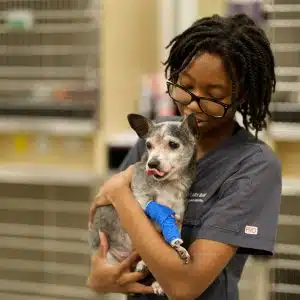Veterinary Oncologist explains common treatment approaches for feline tumors
Comprehensive Guide to the Services Offered by a Vet Oncologist
Veterinary oncology encompasses a broad selection of services focused on identifying and treating cancer in animals. Pet Cancer Surgery. Oncologists use sophisticated diagnostic strategies and provide numerous treatment choices customized to every pet's requirements. They likewise prioritize encouraging treatment and provide useful sources for pet owners. Recognizing these solutions is important for making informed decisions. What specific elements of vet oncology can significantly affect a pet dog's treatment journey?
Understanding Vet Oncology
Vet oncology is a specialized area concentrated on detecting and treating cancer in pets. This discipline incorporates a wide variety of strategies, from medical treatments such as chemotherapy and immunotherapy to surgical interventions focused on eliminating growths. Veterinary oncologists are trained to recognize the special manifestations of cancer in numerous varieties, enabling them to customize treatment plans to private patients.
In addition to conventional therapies, veterinary oncology highlights supportive care, which plays an essential duty in improving the lifestyle for damaged animals. This consists of pain monitoring, nutritional support, and palliative treatment alternatives. Partnership with pet proprietors is important, as they are integral to decision-making concerning their pet dogs' therapy paths. As research advancements, vet oncology proceeds to advance, offering brand-new hope and improved outcomes for family pets diagnosed with cancer. Overall, this area is essential for attending to the intricacies of cancer cells in buddy pets.
Advanced Diagnostic Techniques
Advanced analysis methods play a vital role in veterinary oncology, supplying crucial understandings right into the visibility and extent of cancer in pets. Imaging methods such as ultrasound, CT scans, and MRI are generally employed to visualize tumors and analyze their features. Furthermore, biopsy treatments are necessary for obtaining tissue samples, allowing for definitive medical diagnosis and customized treatment plans.
Imaging Modalities Utilized
Imaging methods play an important duty in the medical diagnosis and administration of cancer in animals. Veterinary oncologists use numerous sophisticated imaging techniques to assess lump transition, size, and presence. Radiography, or X-rays, supplies a preliminary sight of bone and chest problems, while ultrasound gives real-time imaging of soft cells, enabling for in-depth assessment of internal body organs. Calculated tomography (CT) improves visualization of complex physiological structures and allows 3D restorations, assisting in accurate lump localization. Magnetic vibration imaging (MRI) is very useful for soft tissue differentiation, especially in brain tumors. In addition, nuclear medication methods such as positron exhaust tomography (FAMILY PET) assistance identify metabolic task within lumps. Jointly, these methods boost analysis accuracy, assisting reliable therapy approaches for oncological people.
Biopsy Procedures Explained
Following the preliminary analysis through imaging techniques, getting a definitive diagnosis commonly needs cells sampling through biopsy treatments. Vet oncologists use various biopsy methods based upon the growth's place and attributes. Fine needle goal (FNA) is a minimally intrusive method that draws out cells for cytological exam, perfect for surface masses. Core needle biopsies supply larger tissue samples and are valuable for deeper lumps, allowing for histopathological evaluation. Surgical biopsies entail excising a section or the whole growth, facilitating comprehensive analysis. These treatments not just confirm the existence of cancer cells but additionally assist determine its type and quality, assisting treatment decisions. Each biopsy method is picked carefully to balance analysis accuracy with individual safety and security and comfort.
Treatment Alternatives for Cancer Cells in Family pets
When a family pet is diagnosed with cancer cells, a variety of treatment alternatives appear to assist enhance and take care of the illness lifestyle. Veterinary oncologists normally suggest a multidisciplinary method customized to the individual pet's requirements, which may include surgery, radiation treatment, immunotherapy, or different treatments.
Surgery is often utilized to remove lumps and afflicted tissues, potentially resulting in total remission in some instances. Radiation treatment aims to target and destroy cancer cells, lowering growth size and relieving symptoms - Pet Cancer Surgery. Immunotherapy uses the pet's immune system to combat cancer cells better, while different therapies might consist of acupuncture or herbal supplements to sustain total health
Each treatment choice lugs its own benefits and dangers, and vet oncologists work carefully with animal proprietors to develop an extensive strategy that aligns with the animal's certain medical diagnosis and the owner's wishes. The supreme goal is to boost the animal's convenience and lifestyle throughout their cancer trip.
Radiation treatment for Pets
Radiation treatment is a typical treatment option for pet dogs diagnosed with cancer cells and is often utilized combined with other treatments laid out by veterinary oncologists. This therapy involves the administration of particular drugs designed to destroy and target cancer cells, thus minimizing lump size and avoiding the spread of the disease. Vet oncologists customize radiation treatment methods based upon the kind of cancer, the animal's overall wellness, and the desired therapy outcome.
Negative effects can happen, as these drugs may additionally impact healthy and balanced cells. Usual responses include queasiness, throwing up, and short-lived adjustments in appetite - Board Certified Veterinary Oncologist. Vet oncologists are equipped to handle these adverse effects effectively, ensuring the pet's convenience throughout the therapy process. Regular monitoring via blood examinations and follow-up visits is vital to assess the family pet's action to radiation treatment and make necessary changes. Inevitably, chemotherapy can provide considerable advantages, boosting the lifestyle for animals dealing with cancer diagnoses

Radiation Therapy in Vet Medication
Radiation therapy acts as a reliable treatment option for pets diagnosed with local tumors, supplying a targeted technique to cancer cells administration. This method uses high-energy radiation to harm the DNA of cancer cells, inhibiting their ability to proliferate. It is particularly useful for lumps that are not responsive to surgical elimination or for cases where surgical treatment might not be feasible as a result of the lump's location.
Vet oncologists tailor radiation methods based on tumor location, kind, and dimension, as well as the family pet's general health and wellness. Therapy can be delivered by means of outside beam of light radiation or brachytherapy, each with distinctive advantages. Normally, multiple sessions are required to make the most of efficiency while decreasing adverse effects.
Although animals may experience short-lived responses such as skin irritability, the overall purpose is to reduce tumors and minimize symptoms, inevitably boosting the family pet's prognosis and high quality of life. Appropriately, radiation therapy plays an essential function in detailed cancer cells treatment.
Palliative Care and Lifestyle
Palliative care in vet oncology concentrates on improving the lifestyle for family pets encountering terminal health problems, ensuring convenience and self-respect in their last days. This specialized technique prioritizes discomfort administration, sign control, and psychological support. Vet oncologists evaluate each pet dog's specific demands, customizing interventions to ease pain and boost overall well-being.
Strategies might consist of administering medicines for pain relief, handling nausea or vomiting, and dealing with various other upsetting symptoms. Additionally, dietary assistance is often offered to keep toughness and improve cravings. The psychological element of palliative treatment is similarly important; developing a calm environment helps minimize stress and anxiety for both pet and owner.
Ultimately, the objective of palliative treatment is my blog to allow family pets to enjoy their continuing to be time with as much pleasure and self-respect as possible. By concentrating on convenience and lifestyle, veterinary oncologists play a necessary duty in making sure that pet dogs and their households navigate this challenging journey with concern and understanding.
Assistance for Animal Owners During Treatment

Emotional Support for Owners
Charting the psychological landscape during a family pet's cancer cells treatment can be a frustrating experience for proprietors. The uncertainty bordering diagnosis and diagnosis can bring about feelings of helplessness, despair, and stress and anxiety. Vet oncologists acknowledge the relevance of psychological support and commonly offer guidance to help proprietors navigate this difficult trip. Communication is vital; discussing treatment choices and possible outcomes can ease some worries. Furthermore, offering peace of mind that emotional feedbacks are legitimate fosters a supportive environment. Several oncology centers may likewise click this site suggest support system or therapy services customized for pet proprietors, helping with common experiences. Motivating owners to prioritize self-care throughout this moment is crucial, as their psychological well-being straight influences their pet dog's comfort and total treatment experience.

Resources and Educational Products
Guiding through the intricacies of a pet's cancer cells therapy can be intimidating for owners, making access to educational materials and dependable resources crucial. Veterinary oncologists typically provide a range of handouts, pamphlets, and online products that explain treatment choices, prospective negative effects, and care methods. These resources help equip and demystify the procedure family pet proprietors to make educated choices. Additionally, many oncology centers provide access read review to support teams and forums where proprietors can connect with others facing comparable challenges, promoting a sense of neighborhood. Educational workshops and webinars carried out by veterinary professionals further boost understanding, guaranteeing that owners are well-equipped to browse their animal's journey with cancer therapy with confidence and knowledge.
Often Asked Concerns
Just How Can I Prepare My Pet Dog for a Vet Oncology See?
Preparing an animal for a vet oncology check out entails event clinical records, noting symptoms, and making sure the animal is comfortable. A calm temperament and acquainted products can assist alleviate stress and anxiety during the appointment.
What Are the Indications My Pet May Have Cancer Cells?
Signs that a pet dog may have cancer include unusual weight management, consistent throwing up or looseness of the bowels, unusual lumps or swellings, lethargy, changes in cravings, problem breathing, and changes in behavior. Prompt veterinary interest is crucial.
Just How Can I Support My Pet Mentally During Treatment?
Sustaining a family pet emotionally during therapy entails supplying convenience, maintaining routines, offering mild love, and guaranteeing a tranquil setting. Taking part in silent play and regular companionship assists alleviate tension and fosters a feeling of protection.
Exist Alternate Therapies for Pets With Cancer cells?
Alternative treatments for pets with cancer include acupuncture, natural treatments, and dietary assistance. These techniques may match standard therapies, promoting overall wellness. Consulting with a vet is important for secure and effective assimilation of alternate therapies.
What Prices Should I Anticipate for Veterinary Oncology Services?
The awaited prices for vet oncology solutions can differ considerably, frequently influenced by diagnostics, therapies, and continuous care. Pet owners need to plan for expenses ranging from appointments to specialized therapies, reflecting the complexity of cancer monitoring.
Partnership with animal owners is important, as they are indispensable to decision-making concerning their pets' therapy paths. Each treatment choice lugs its own advantages and threats, and vet oncologists function carefully with animal proprietors to make a detailed plan that lines up with the pet dog's specific diagnosis and the owner's desires. Pets may experience short-term reactions such as skin irritation, the total purpose is to reduce growths and minimize symptoms, eventually boosting the pet's prognosis and high quality of life. Support for family pet proprietors throughout treatment is vital in guiding with the psychological obstacles connected with an animal's cancer cells medical diagnosis. Preparing a family pet for a veterinary oncology check out includes event medical records, noting symptoms, and making sure the pet dog is comfortable.